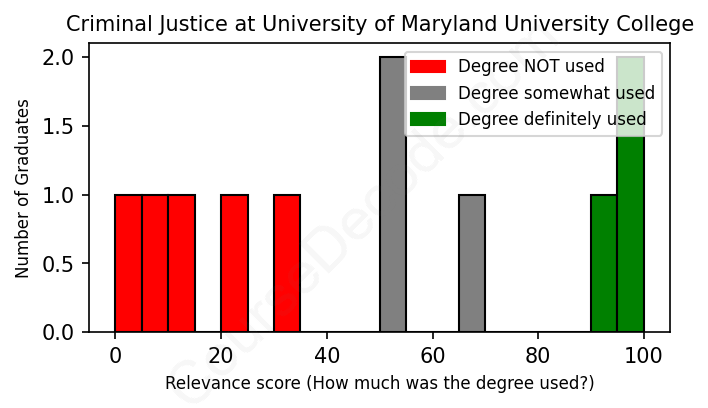
First, some facts. Of the Criminal Justice graduates from University of Maryland University College we've analyzed , here's how many have used (or NOT used) their degree in their career:

These are estimates based on AI analysis of 11 LinkedIn profiles (see below).
The verdict? Significantly below average. Overall, with an average relevance score of 48%, Criminal Justice graduates from University of Maryland University College have a much lower likelihood (-19%) of finding work in this field compared to the average graduate across all fields:
And for comparison, here's the chart for all profiles we've looked at across all degrees.
Also, after graduating, 54% of these graduates have pursued further education other than another Bachelor's degree (such as a Masters degree or other), compared to the average across all profiles of 35%. This suggests you may need more than just a Bachelors degree to be competitive as a Criminal Justice graduate.
See the details:
|
Relevance score: 50% We think this person has gone into a career only somewhat relevant to their degree. We think this person has gone into a career only somewhat relevant to their degree.
DEGREE INFOGraduated in 2020 from University of Maryland University College with a Bachelor's degree in Criminal Justice. No other secondary education since. JOB HISTORY SINCE GRADUATIONInformation Technology Security Specialist Joint Force Headquarters - Department of Defense Information Network Jun 2023 - Present ABOUTNo information provided. |
The top 10 most common jobs done by the graduates we've analyzed (ranked most common to least) are:
After looking at the LinkedIn profiles of folks who graduated with a Criminal Justice degree from the University of Maryland University College, it seems like a mixed bag of careers. The most common types of jobs include roles in management, IT, and some positions in security. While some of these roles touch on aspects of security, risk management, or ethical considerations, a majority don't directly utilize the specific skills or knowledge that come from a Criminal Justice program. For example, many grads have found themselves in project management or even roles in real estate, which, let's be honest, don’t really scream 'criminal justice.'
However, there are a few standout positions that are definitely more relevant, like Correctional Officers and Investigators in federal agencies, which are perfect fits for someone with a Criminal Justice background. These roles directly apply what they learned in school. Overall, while some graduates do find jobs that relate closely to criminal justice, many end up in positions that are only loosely connected, suggesting that the degree can lead to a variety of career paths, not all of which are tied to the criminal justice system itself.
Here is a visual representation of the most common words in job titles for Criminal Justice graduates (this is across all Criminal Justice graduates we've analyzed, not just those who went to University of Maryland University College):

Looking at the career paths of graduates from the University of Maryland University College with a degree in Criminal Justice, it seems like a mixed bag when it comes to landing jobs directly related to the field. Right after graduation, many of these individuals took on roles that don’t wholly align with traditional criminal justice careers. For example, some started out as office managers, program managers, or even virtual assistants, which are roles that could be relevant in some capacities but aren't necessarily what you would expect if you're looking to dive into criminal justice work. However, as we look deeper into their trajectories, we see that there are more specialized roles that many have transitioned into within a few years, like working as correctional officers, security analysts, and investigators. So while the first job out of college may not be the most direct link to criminal justice, some do manage to steer their careers towards the field eventually.
Fast forward five to ten years after graduation, and there's a noticeable split in the paths taken. Graduates who stuck it out in related fields often moved up the ranks and have taken on more significant roles, like directors and consultants in security and criminal justice-related areas. Those who ventured off into different paths, like real estate or project management, don’t seem tied to the criminal justice domain at all. This variability suggests that while some graduates are forging successful careers that connect strongly to criminal justice, others might be drifting away from it, taking advantage of a broader range of opportunities. Overall, if you're looking at this degree with the idea of working in criminal justice, it's clear that while the start may not be a direct hit, it's feasible to create a relevant and rewarding career in the field over time.
Getting a Bachelor’s degree in Criminal Justice, including at places like the University of Maryland University College, is generally considered to be more on the manageable side compared to some other degrees. While you'll definitely have to deal with reading, writing papers, and maybe a few tough concepts related to law enforcement and the justice system, it's not usually overly difficult if you stay organized and engaged. The program often attracts a lot of students who are genuinely interested in the subject, which can make discussions more interesting and the classes feel engaging. So, if you're really into the topics, you'll probably find it pretty doable! Just keep up with your assignments, and you should be okay.
Most commonly, in the LinkedIn profiles we've looked at, it takes people 2 years to finish a Bachelor degree in Criminal Justice.
Looking at these Criminal Justice grads from the University of Maryland University College, it seems like some have really landed decent gigs while others are still figuring things out. The ones who got into big companies like Google or moved up the ladder in secure roles, like the Director at CGI or the Security Analyst at Parsons, probably make pretty good money given those positions and their experience. On the other hand, there are folks like the Correctional Officer or the Virtual Assistants who might not be raking in the same cash, as those roles usually pay less, especially starting out. Overall, it looks like the potential is there for a good salary, but actual earnings vary a lot based on the specific paths they’ve taken.
Here is a visual representation of the most common words seen in the "about" section of LinkedIn profiles who have a Bachelor degree in Criminal Justice (this is across all Criminal Justice graduates we've analyzed, not just those who went to University of Maryland University College). This may or may not be useful:

Here are all colleges offering a Bachelor degree in Criminal Justice (ordered by the average relevance score of their Criminal Justice graduates, best to worst) where we have analyzed at least 10 of their graduates: